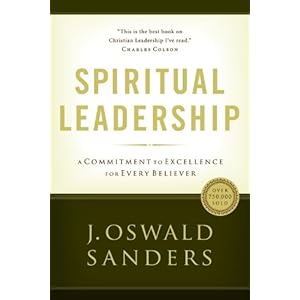Hundreds, if not thousands of books are published every year in the area of leadership and leadership development. I personally spent four years in the United States Marine Corps, a leadership factory that instills qualities of initiative, teamwork, and dedication to mission. However, I have not interacted with many materials that focus more intensely on introspection, than on how to get things done. Spiritual Leadership is tremendously challenging. It gives great practical leadership council in regards to delegating, spending time in reading, spending time with people, and weighing the cost of leadership on the family. Yet, the author, J. Oswald Sanders notes that “A person can have a brilliant mind and possess artful administrative skill. But without spirituality he is incapable of giving truly spiritual leadership.” This is a foundational truth that I missed in many of my formative years as a young leader.
Sanders starts with a discussion about the ambition of being a leader. He starts by asking the question many leadership manuals ask: Why would anyone want to be a leader? I find this reminiscent of my experience with Marine recruiters. When the military branches are represented at a recruiting event, most branches will talk about the college benefits available for military personnel, or promise the recruited the opportunity to travel and see the world. Marine recruiters are trained however to do the exact opposite. They explain to the young individual the litany of reasons why they wouldn't be a good fit for the Marines, and why the college benefits although extensive are not reason enough to sign up for the pain and suffering every Marine is bound to endure. Interestingly enough it works. Like a charm. Marine recruiters continue to meet their quota month after month after month. Similarly, Sanders draws the reader in when he quotes missionary Bishop Stephen Neill who said: “I am inclined to think that ambition in any ordinary sense of the term is always sinful, and that it is most inexcusable of all in the ordained minister.” The leadership concepts I learned in the Marines are flawed for ministry in that Jesus has no time for such ego-driven ambitions. The true spiritual leader will never “campaign for promotion.”
As I found the challenge laid out by the Marine recruiter compelling many years ago, I find Sanders challenge equally irresistible. The author outlines Paul’s life as a leader, notes his various life shaping leadership experiences, and declares that Paul had “boundless, Christ centered ambition,” Sanders illustrates Peter as a leader who had to learn through trials, but gives him credit for being a virtuoso apostle who takes the position of fellow elder, alongside others bearing similar burdens. Spiritual Leadership provokes me to action when the author motivates me to emulate Christ and His Apostles. That’s where the strength of this book, and it’s unique perspective on leadership becomes apparent: when the power of God’s Word comes to life.







0 comments:
Post a Comment